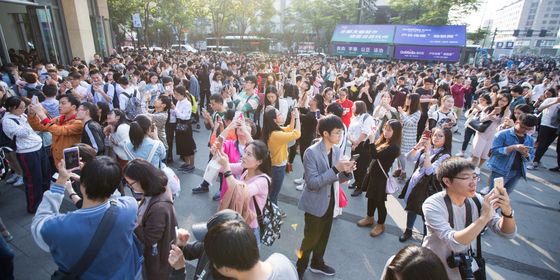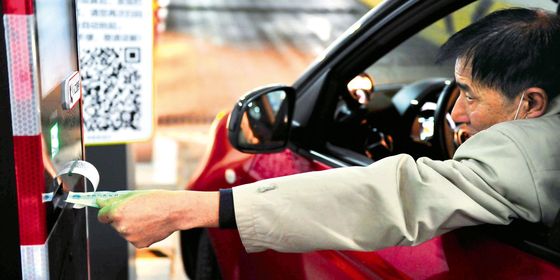Selling noodles as well as medicine, the humble vending machines get rebranded as the face of China’s “New Retail”
Those who still think of vending machines as overpriced, unwanted drinks have a hot surprise waiting for them Liuzhou, Guangxi Zhuang Autonomous Region, where a new automated contraption has been seen dispensing rice noodles on demand.
According to Nanning News, June 3 saw the opening of the world’s first vending machine for freshly made luoshifen (螺蛳粉, Snail Rice-Flour Noodles), a pungent local delicacy consisting of rice noodles with pickled bamboo shoots and river snail shells. After waiting just two minutes, the machine produces a piping bowl of noodle with customizable sides, including eggs, duck foot, and chilis, all for just 8 RMB.
It’s not the first vending machines have recently made Chinese headlines. The country’s shopping centers are littered with fresh orange juice machines, fresh coconut water machines, and even organic yogurt machines. In April, Tmall unveiled its first wine vending machine. All the connoisseur needs to do is pull up the wine they want on the Tmall app, scan the QR code on the machine, and open the door; the amount is automatically charged when the door closes. Not to be outdone, JD.com had already launched medicine vending machines last year that are supposed to take care of customers’ late-night medication needs within five seconds.
The vending machine is not a new concept—Japan has been the world’s leader at it since the 1970s—but automation is the fad in Chinese retail due to a new buzzword: New Retail, a fuzzily defined idea that combines offline and online shopping solutions, including user terminals that collect customer data and try to better serve their needs across different platforms.
Tmall’s self-service supermarket, which opened during last year’s World Internet Conference in Wuzhen, are one of the most heavily touted examples of New Retail. To shop at this entirely staff-less store, scan your Taobao or Alipay QR code at the entrance, grab what you want, and money will be automatically deducted from your account as you walk out of the store. You can also explore online products on Tmall.com from screens in the shop, or get a discount if you smile at the products. Hundreds of self-service supermarkets have been opened since last summer, from 7-Eleven’s X-Store in Taiwan to Huoxing Hezi (火星盒子, Mars Box), a popular self-service supermarket, selling not only regular supermarket products but also electronics and furniture.
But is New Retail more than just slapping on a QR code? Some commentators have raised this question, due to the lack of maintenance of many vending machines and self-service terminals. According to Sina Business, of the over 20 companies currently getting financing for New Retail vending machines, the amounts accessed vary from the millions to hundred millions of RMB. Vending machines require a lot of investments, including rental fees, maintenance, and even electronic and internet charges, and companies are finding it difficult to get a return on their investment after opening up shop on campuses, offices, and malls due to lack of demand. There’s also little evidence people are finding automated stores better or more convenient than old-fashioned convenient stores.
Other problems common in Chinese retail persist in spite of automation, including issues with food safety and getting refunds. “The bottle of Coke I bought from the [subway] vending machine didn’t drop even after the train arrived,” went a recent joke on the internet, “but though I didn’t get my favorite Coke, I got the Sprite of the person before me.” Offline or online, at least the love of a good deal never changes.












